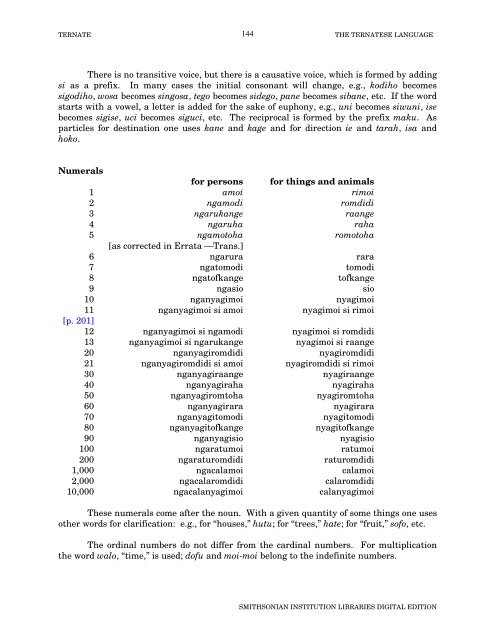Ternate - Smithsonian Institution Libraries
Ternate - Smithsonian Institution Libraries
Ternate - Smithsonian Institution Libraries
Create successful ePaper yourself
Turn your PDF publications into a flip-book with our unique Google optimized e-Paper software.
TERNATE 144<br />
THE TERNATESE LANGUAGE<br />
There is no transitive voice, but there is a causative voice, which is formed by adding<br />
si as a prefix. In many cases the initial consonant will change, e.g., kodiho becomes<br />
sigodiho, wosa becomes singosa, tego becomes sidego, pane becomes sibane, etc. If the word<br />
starts with a vowel, a letter is added for the sake of euphony, e.g., uni becomes siwuni, ise<br />
becomes sigise, uci becomes siguci, etc. The reciprocal is formed by the prefix maku. As<br />
particles for destination one uses kane and kage and for direction ie and tarah, isa and<br />
hoko.<br />
Numerals<br />
for persons for things and animals<br />
1 amoi rimoi<br />
2 ngamodi romdidi<br />
3 ngarukange raange<br />
4 ngaruha raha<br />
5 ngamotoha<br />
[as corrected in Errata ⎯Trans.]<br />
romotoha<br />
6 ngarura rara<br />
7 ngatomodi tomodi<br />
8 ngatofkange tofkange<br />
9 ngasio sio<br />
10 nganyagimoi nyagimoi<br />
11<br />
[p. 201]<br />
nganyagimoi si amoi nyagimoi si rimoi<br />
12 nganyagimoi si ngamodi nyagimoi si romdidi<br />
13 nganyagimoi si ngarukange nyagimoi si raange<br />
20 nganyagiromdidi nyagiromdidi<br />
21 nganyagiromdidi si amoi nyagiromdidi si rimoi<br />
30 nganyagiraange nyagiraange<br />
40 nganyagiraha nyagiraha<br />
50 nganyagiromtoha nyagiromtoha<br />
60 nganyagirara nyagirara<br />
70 nganyagitomodi nyagitomodi<br />
80 nganyagitofkange nyagitofkange<br />
90 nganyagisio nyagisio<br />
100 ngaratumoi ratumoi<br />
200 ngaraturomdidi raturomdidi<br />
1,000 ngacalamoi calamoi<br />
2,000 ngacalaromdidi calaromdidi<br />
10,000 ngacalanyagimoi calanyagimoi<br />
These numerals come after the noun. With a given quantity of some things one uses<br />
other words for clarification: e.g., for “houses,” hutu; for “trees,” hate; for “fruit,” sofo, etc.<br />
The ordinal numbers do not differ from the cardinal numbers. For multiplication<br />
the word walo, “time,” is used; dofu and moi-moi belong to the indefinite numbers.<br />
SMITHSONIAN INSTITUTION LIBRARIES DIGITAL EDITION

















